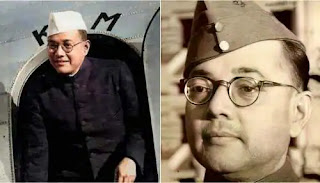Netaji Subhas Chandra Bose - Indian freedom fighter & his achievements
Subhas Chandra Bose (1897–1945) was a prominent Indian nationalist leader during the struggle for independence against British rule. Born in Cuttack on 23rd January 1897 , Odisha, Bose studied in England and later joined the Indian Civil Service. However, his nationalist sentiments led him to resign and immerse himself in the freedom movement.
Bose rose to prominence as a leader within the Indian National Congress, but ideological differences with Mahatma Gandhi and other leaders prompted him to form the Forward Bloc in 1939. During World War II, Bose sought foreign support to help liberate India from British rule. He formed the Indian National Army (INA) with Japanese assistance and led it against the British in Burma and Northeast India.
Tragically, Bose's mysterious death in a plane crash in 1945 remains a subject of speculation and debate. Despite his controversial alliances, Bose's legacy is that of a fervent nationalist who sought unconventional means to achieve India's independence.
Subhas Chandra Bose had several notable achievements during his life:
1. **Indian National Congress Leadership:**
- Bose served as the President of the Indian National Congress in 1938 and 1939. However, ideological differences with other leaders, particularly Mahatma Gandhi, led to his resignation.
2. **Formation of Forward Bloc:**
- Disillusioned with the Congress, Bose founded the Forward Bloc in 1939, a political organization that aimed to unite like-minded anti-British forces.
3. **Escape to Germany and Axis Alliance:**
- During World War II, Bose sought support from Nazi Germany and Fascist Italy to help India gain independence. He escaped house arrest in Calcutta in 1941 and traveled to Germany, eventually forming the Free India Center in Berlin.
4. **Formation of the Indian National Army (INA):**
- Bose, with Japanese assistance, formed the Azad Hind Fauj (Indian National Army) in 1942. The INA aimed to liberate India from British rule and played a significant role in the Burma Campaign against the British.
5. **INA's March to India:**
- The INA, under Bose's leadership, undertook the Imphal-Kohima Campaign in 1944, reaching the borders of India. However, they had to retreat due to unfavorable conditions.
6. **Red Fort Trials:**
- The INA's activities and the capture of some of its members led to the famous Red Fort Trials in Delhi in 1945. The trials had a significant impact on the Indian public, raising nationalist fervor.
7. **Legacy and Impact:**
- Bose's legacy lies in his unwavering commitment to India's independence and his efforts to garner international support. Despite the controversial alliances, he remains a symbol of resistance against British colonial rule.
8. **Mysterious Death:**
- Bose's death in a plane crash in 1945 remains shrouded in mystery. The circumstances surrounding his death have led to various theories and speculation.
Subhas Chandra Bose's contributions to India's struggle for independence, particularly through the INA, have left an indelible mark on the country's history.




Comments
Post a Comment